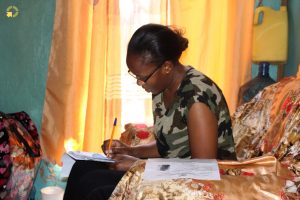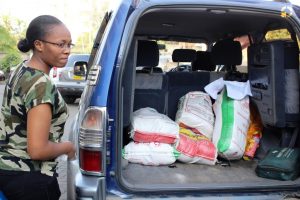Integral to RefugePoint’s holistic service model in our Urban Refugee Protection Program (URPP) is our Social Work team, comprised of four Social Workers, a Program Associate, an Education Officer, a Child Protection Officer, and a Program Manager. Often, a Social Worker is one of the very first staff members that a new client will interact with. Many of these new clients have just arrived to Nairobi and don’t know where to turn for assistance.
Through food, rent, and education support, our Social Work team empowers clients to transition out of highly vulnerable circumstances like unsafe housing, survival sex, and just one meal a day, to self-sufficiency, and ultimately, self-reliance. Using a case management approach, clients are assigned an individual social worker that oversees their entire experience at RefugePoint, from intake to graduation. Working closely with our Medical team, Counselors, and Livelihoods Program, Social Workers help guide clients through the graduation model, assessing their unique and individual needs every step along the way. Whether they need assistance enrolling their children in school, a translator to access medical services, or group therapy to help develop healthy coping mechanisms, RefugePoint clients build a case plan with a Social Worker to set goals, measure progress, and create opportunities for self-reliance.
We want to share with you what a typical day in the field looks like for RefugePoint Social Workers in Nairobi, and so we recently spent the day with Caroline, a RefugePoint Social Worker who shares a first-hand account of a typical day in the field interacting with clients.

Name: Caroline
Title: Social Worker
Date: July 2017
Assignment: Food Distribution and Primary Household Bio-Data Collection
Neighborhood: Eastleigh
Today I am going to Eastleigh, a neighborhood in Nairobi, to collect information from a new client who is an Ethiopian refugee named Hamid* who was recently assessed and found to be at-risk. I will interview Hamid to gather general information about him, how he is doing in Kenya, as well as information about why and how he fled from Ethiopia.
Additionally, on this trip, I will be distributing food to some clients who are part of the food assistance program but were unable to make it to the office to collect their food this week. I have arranged to meet them at a central point in Eastleigh, and I do this before heading to my interview with Hamid.
One of the clients who comes to collect her food ration is ill, and informs us that she is unable to carry the items by herself. I decide that we [the field team] will help her to transport the items back to her house, which is on the way to Hamid’s residence. Once we deliver the food, we head over to the home in which Hamid is staying.
Hamid was first assessed by my colleague a few weeks ago, using the self-reliance measurement tool (SRMT). Created by RefugePoint, the SRMT is used to evaluate how refugees are doing in key areas such as shelter, food security, income, education, and physical and mental health. We use the SRMT once at the time of intake into the program and every six months thereafter.
Hamid scored poorly on the SRMT scale, and so I have been assigned as his case manager. The information that I am collecting from Hamid today will be used to develop a case plan that I will draft with input from Hamid, as we determine the ways in which he can reach self-reliance through RefugePoint’s services.
Hamid is Oromo, and cannot communicate in either English or Swahili. The Oromo are the largest ethnic group in Ethiopia and the wider Horn of Africa. Luckily, RefugePoint has a special team of Community Navigators, who are people who live in the same neighborhoods as our clients (and many of whom are clients or former clients themselves), and serve as translators, and ambassadors – helping to identify the most vulnerable refugees in Nairobi, and referring them for our services. Today, Dibaba*, one of our Community Navigators, is assisting me with the interview.
As I begin asking Hamid questions, I learn that he arrived to Kenya quite recently, in March 2017. At that time, our Community Navigator, Dibaba, was contacted by community elders and was asked to assist an at-risk Oromo refugee who had recently arrived to the neighborhood. At the time, Hamid had no money or resources and was unable to support himself, so Dibaba referred him to RefugePoint and also took him in to his own home and assisted him with his registration as an asylum seeker.
During our interview, Hamid tells me that he fled Ethiopia after 10 years of incarceration for suspicion of supporting the Oromo Liberation Front (OLF), an outlawed rebel organization as labeled by the Ethiopian government. He felt that his life was in danger and therefore, he left everything behind, including his wife.
Because he had no money, and had just been released from detention, Hamid found himself begging for food and hitchhiking over long distances. In order to make a little money, he agreed to herd cattle with a nomad across the border into Kenya. In the end, he was paid nothing. Hamid then met a long-distance trader who agreed to assist him in reaching Nairobi. When he arrived, he met Dibaba, who took him to UNHCR where his case was marked as high-profile. He was advised to stay in Nairobi as opposed to going to Kakuma refugee camp, to await the determination of his refugee status.
Back at home, before his detention, Hamid was a high-school physics teacher. Dibaba speaks highly of Hamid and says that he is a very skilled and eloquent. “He even assists my girls with their homework in mathematics and physics when they are home.”
Although he is very grateful to Dibaba for hosting him, Hamid has security concerns and says that he would like to be independent and to make something out of his new life. He has no intentions of returning to Ethiopia.
As I left the home, I reassured Hamid that I would report back to the office with the information that I had collected, and that we would find a way to move forward with his case. I let Hamid know that the next step will likely be for him to visit the RefugePoint office for a second interview, to discuss more about his case plan. I also advised Hamid to think of ways that he would like to keep himself busy…to pursue a skill or any other talent that he can think of.
Although there are many challenges that come with working in the field, I really enjoy my work. I take pleasure recognizing that I am making a difference in someone’s life. When I go home after a long day, I appreciate the referrals that I have made for food, medical services, and rent support…and I feel that I have changed lives. This work also makes me value the things that I have in my own life.
*names have been changed to protect the identity of people